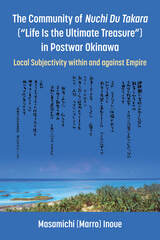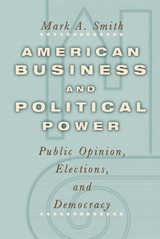
Rather than succumbing to corporate America, Smith argues, representatives paradoxically become more responsive to their constituents when facing a united corporate front. Corporations gain the most influence over legislation when they work with organizations such as think tanks to shape Americans' beliefs about what government should and should not do.
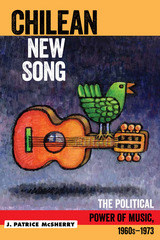
In Chilean New Song, J. Patrice McSherry deftly combines a political-historical view of Chile with a narrative of its cultural development. She examines the democratizing power of this music and, through interviews with key protagonists, the social roles of politically committed artists who participated in a movement for change. McSherry explores the impact of Chilean New Song and the way this artistic/cultural phenomenon related to contemporary politics to capture the passion, pain, and hope of millions of Chileans.

After the May Fourth Incident, John Dewey’s followers in China assumed the leadership of an important group of intellectuals who were largely veterans of the New Culture movement. The Chinese Communist movement had its inception in the same two years Dewey lectured in China (1919–1921); Dewey’s followers pitted their “liberalism” against this new radical alternative, in arguments that proved to be harbingers of a thirty-year conflict in Chinese politics.
The Dewey Experiment in China critically analyzes the careers and writings of John Dewey’s followers through the 1920s—particularly Kuo Ping-wen, Chiang Meng-lin, and T’ao Hsing-chih—as they attempted to implement Dewey’s political reform ideas and his progressive educational principles. The “new education” reform movement was spearheaded by Deweyites and directed a national-level educational reform effort for many years following World War I. Many of Dewey’s ideas that seemed most progressive in the United States are shown to be surprisingly conservative for China. The promise of progress implicit in problem-solving based upon conflicts in actual, concrete social conditions, as Dewey formulated it, deluded its proponents with a false hope of efficacy. The issue of political power was not adequately addressed. In education, unspoken assumptions about progressive reform in the United States proved to be absent in China.
The most dedicated Deweyites were forced to “turn Dewey on his head” by the end of the 1920s. What appeared to Dewey to be democracy through interest-group bartering among nations was often understood in “Third World” China as Big Power politics and the exploitation of the weak. The Dewey Experiment in China reflects, therefore, not only upon Dewey’s own thought but upon the fragility of many American ideas assumed to have been applicable again after World War II in China and Southeast Asia.

Woodstock launched this project on lobbying in 1998 for three reasons. First, lobbying has grown exponentially during the past twenty years to exercise enormous influence on American politics. It has almost become a new profession in that time, and therefore deserves a new review and evaluation.
Second, lobbying has simultaneously fallen under suspicion and engendered critical resentment in some quarters. Its critics would say it supports "special" (i.e. narrow and well-funded) interests and is oblivious to the general well-being of our democratic life and process.
Third, reputable lobbyists have called, therefore, for a clarification of standards and principles for use within their own ranks and as an explanation to the general public of the goals, objectives, and methods of lobbying to forestall misunderstanding and misjudgment. This clarification would provide the lobbying profession with a normative statement parallel to the codes of conduct and ethical practice of the American Medical Association and the American Bar Association.

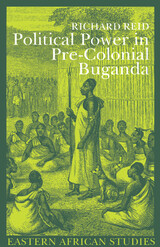
Blessed with fertile and well-watered soil, East Africa’s kingdom of Buganda supported a relatively dense population and became a major regional power by the mid-nineteenth century. This complex and fascinating state has also long been in need of a thorough study that cuts through the image of autocracy and military might.
Political Power in Pre-Colonial Buganda explores the material basis of Ganda political power, gives us a new understanding of what Ganda power meant in real terms, and relates the story of how the kingdom used the resources at its disposal to meet the challenges that confronted it. Reid further explains how these same challenges ultimately limited Buganda’s dominance of the East African great lakes region.

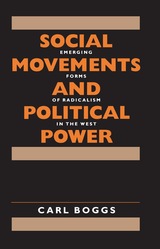

Sound System is the story of one musician’s journey to discover what exactly makes music so powerful. Years of touring, protesting, and performing have given Dave Randall an insider’s view of the music industry, enabling him to shed light on the most tightly held secrets of celebrity, commodification, and culture. He finds remarkable examples of music as a force of social change as well as something that has been used to keep people in their place throughout history. From the Glastonbury Festival to the Arab Spring, Pop Idol to Trinidadian Carnival, Randall finds political inspiration across the musical spectrum.
A blistering, intelligent polemic about the political power of music, Sound System investigates the raves, riots, and revolution of contemporary culture to answer the question—how can we make music serve the interest of the many, rather than the few?
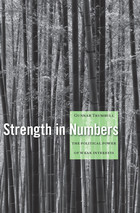
Many consumers feel powerless in the face of big industry’s interests. And the dominant view of economic regulators (influenced by Mancur Olson’s book The Logic of Collective Action, published in 1965) agrees with them. According to this view, diffuse interests like those of consumers are too difficult to organize and too weak to influence public policy, which is determined by the concentrated interests of industrial-strength players. Gunnar Trumbull makes the case that this view represents a misreading of both the historical record and the core logic of interest representation. Weak interests, he reveals, quite often emerge the victors in policy battles.
Based on a cross-national set of empirical case studies focused on the consumer, retail, credit, pharmaceutical, and agricultural sectors, Strength in Numbers develops an alternative model of interest representation. The central challenge in influencing public policy, Trumbull argues, is not organization but legitimation. How do diffuse consumer groups convince legislators that their aims are more legitimate than industry’s? By forging unlikely alliances among the main actors in the process: activists, industry, and regulators. Trumbull explains how these “legitimacy coalitions” form around narratives that tie their agenda to a broader public interest, such as expanded access to goods or protection against harm. Successful legitimizing tactics explain why industry has been less powerful than is commonly thought in shaping agricultural policy in Europe and pharmaceutical policy in the United States. In both instances, weak interests carried the day.
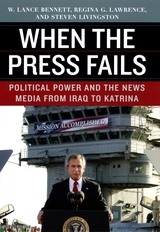
“The hand-in-glove relationship of the U.S. media with the White House is mercilessly exposed in this determined and disheartening study that repeatedly reveals how the press has toed the official line at those moments when its independence was most needed.”—George Pendle, Financial Times
“Bennett, Lawrence, and Livingston are indisputably right about the news media’s dereliction in covering the administration’s campaign to take the nation to war against Iraq.”—Don Wycliff, Chicago Tribune
READERS
Browse our collection.
PUBLISHERS
See BiblioVault's publisher services.
STUDENT SERVICES
Files for college accessibility offices.
UChicago Accessibility Resources
home | accessibility | search | about | contact us
BiblioVault ® 2001 - 2025
The University of Chicago Press


